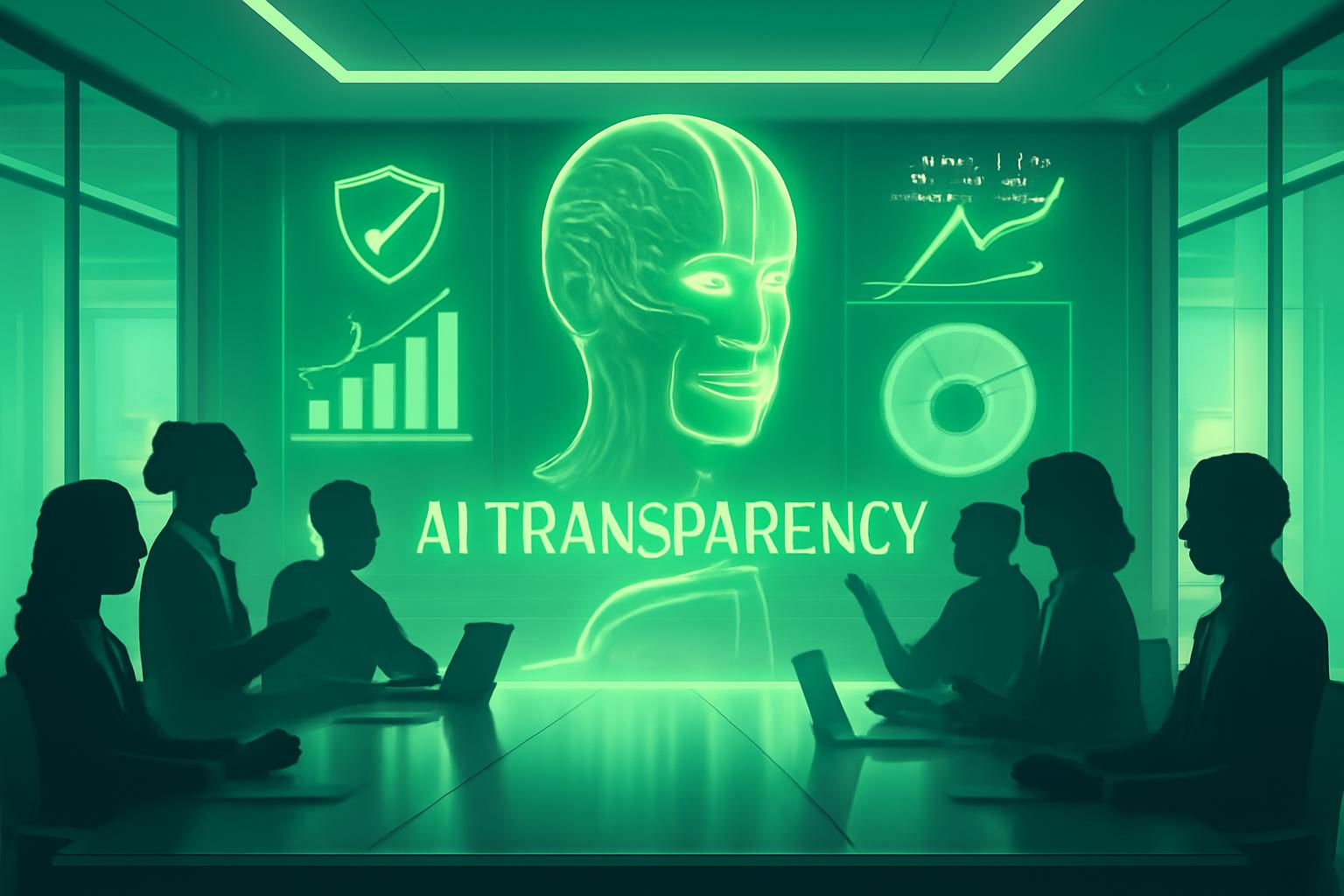Senator Wiener’s SB 53 marks a pragmatic shift in AI regulation from punitive liability to transparency and risk management. By focusing on catastrophic risks and imposing reporting requirements on the largest AI companies, California aims to balance innovation with public safety amid federal regulatory uncertainty. !-- wp:paragraph -->
Contents
FinOracleAI — Market ViewFinOracleAI — Market ViewLooking Ahead: The Bill’s Prospects and California’s RoleFinOracleAI — Market ViewLooking Ahead: The Bill’s Prospects and California’s RoleFinOracleAI — Market ViewKey Provisions of SB 53Senator Wiener’s Perspective on AI Safety and InnovationLooking Ahead: The Bill’s Prospects and California’s RoleFinOracleAI — Market ViewKey Provisions of SB 53Senator Wiener’s Perspective on AI Safety and InnovationLooking Ahead: The Bill’s Prospects and California’s RoleFinOracleAI — Market ViewIndustry Response and Political DynamicsKey Provisions of SB 53Senator Wiener’s Perspective on AI Safety and InnovationLooking Ahead: The Bill’s Prospects and California’s RoleFinOracleAI — Market ViewIndustry Response and Political DynamicsKey Provisions of SB 53Senator Wiener’s Perspective on AI Safety and InnovationLooking Ahead: The Bill’s Prospects and California’s RoleFinOracleAI — Market ViewSB 53: A Targeted Approach to AI Risk TransparencyIndustry Response and Political DynamicsKey Provisions of SB 53Senator Wiener’s Perspective on AI Safety and InnovationLooking Ahead: The Bill’s Prospects and California’s RoleFinOracleAI — Market ViewCalifornia Senator Pushes Forward on AI Safety with New Transparency BillSB 53: A Targeted Approach to AI Risk TransparencyIndustry Response and Political DynamicsKey Provisions of SB 53Senator Wiener’s Perspective on AI Safety and InnovationLooking Ahead: The Bill’s Prospects and California’s RoleFinOracleAI — Market View
- Opportunities: Increased transparency could improve AI safety and public trust, encouraging responsible innovation.
- Risks: Potential legal challenges on constitutional grounds and pushback from industry lobbying may delay implementation.
- Creation of state AI infrastructure (CalCompute) may democratize AI research beyond Big Tech dominance.
- State-level leadership could prompt federal regulators to adopt clearer AI safety frameworks.
FinOracleAI — Market View
Senator Wiener’s SB 53 marks a pragmatic shift in AI regulation from punitive liability to transparency and risk management. By focusing on catastrophic risks and imposing reporting requirements on the largest AI companies, California aims to balance innovation with public safety amid federal regulatory uncertainty. !-- wp:paragraph -->- Opportunities: Increased transparency could improve AI safety and public trust, encouraging responsible innovation.
- Risks: Potential legal challenges on constitutional grounds and pushback from industry lobbying may delay implementation.
- Creation of state AI infrastructure (CalCompute) may democratize AI research beyond Big Tech dominance.
- State-level leadership could prompt federal regulators to adopt clearer AI safety frameworks.
FinOracleAI — Market View
Senator Wiener’s SB 53 marks a pragmatic shift in AI regulation from punitive liability to transparency and risk management. By focusing on catastrophic risks and imposing reporting requirements on the largest AI companies, California aims to balance innovation with public safety amid federal regulatory uncertainty. !-- wp:paragraph -->- Opportunities: Increased transparency could improve AI safety and public trust, encouraging responsible innovation.
- Risks: Potential legal challenges on constitutional grounds and pushback from industry lobbying may delay implementation.
- Creation of state AI infrastructure (CalCompute) may democratize AI research beyond Big Tech dominance.
- State-level leadership could prompt federal regulators to adopt clearer AI safety frameworks.
Looking Ahead: The Bill’s Prospects and California’s Role
SB 53 currently awaits Governor Gavin Newsom’s decision. The governor previously vetoed SB 1047 but has since convened working groups that influenced the drafting of SB 53, signaling potential openness to the new bill. !-- wp:paragraph --> If signed, California would establish some of the nation’s first formal AI safety reporting requirements and infrastructure, setting a precedent for other states and potentially influencing federal regulatory approaches. !-- wp:paragraph -->FinOracleAI — Market View
Senator Wiener’s SB 53 marks a pragmatic shift in AI regulation from punitive liability to transparency and risk management. By focusing on catastrophic risks and imposing reporting requirements on the largest AI companies, California aims to balance innovation with public safety amid federal regulatory uncertainty. !-- wp:paragraph -->- Opportunities: Increased transparency could improve AI safety and public trust, encouraging responsible innovation.
- Risks: Potential legal challenges on constitutional grounds and pushback from industry lobbying may delay implementation.
- Creation of state AI infrastructure (CalCompute) may democratize AI research beyond Big Tech dominance.
- State-level leadership could prompt federal regulators to adopt clearer AI safety frameworks.
Looking Ahead: The Bill’s Prospects and California’s Role
SB 53 currently awaits Governor Gavin Newsom’s decision. The governor previously vetoed SB 1047 but has since convened working groups that influenced the drafting of SB 53, signaling potential openness to the new bill. !-- wp:paragraph --> If signed, California would establish some of the nation’s first formal AI safety reporting requirements and infrastructure, setting a precedent for other states and potentially influencing federal regulatory approaches. !-- wp:paragraph -->FinOracleAI — Market View
Senator Wiener’s SB 53 marks a pragmatic shift in AI regulation from punitive liability to transparency and risk management. By focusing on catastrophic risks and imposing reporting requirements on the largest AI companies, California aims to balance innovation with public safety amid federal regulatory uncertainty. !-- wp:paragraph -->- Opportunities: Increased transparency could improve AI safety and public trust, encouraging responsible innovation.
- Risks: Potential legal challenges on constitutional grounds and pushback from industry lobbying may delay implementation.
- Creation of state AI infrastructure (CalCompute) may democratize AI research beyond Big Tech dominance.
- State-level leadership could prompt federal regulators to adopt clearer AI safety frameworks.
“I lack faith in the federal government to pass meaningful AI safety regulation, so states need to step up,” Senator Wiener told TechCrunch, criticizing the Trump administration’s pivot from AI safety to growth-focused policies.Key Provisions of SB 53
- Mandatory safety reports from AI companies with revenues exceeding $500 million.
- Focus on catastrophic AI risks: death, cyberattacks, and bioweapons.
- Protected whistleblower channels for AI lab employees to report safety concerns to government officials.
- Creation of CalCompute, a state-operated cloud computing cluster to support AI research beyond Big Tech.
Senator Wiener’s Perspective on AI Safety and Innovation
Representing San Francisco, the heart of AI innovation, Wiener balances support for technological progress with calls for robust safety measures. He emphasizes that AI is not inherently safe and that mitigating catastrophic risks is essential to protect public health and safety without stifling innovation. !-- wp:paragraph --> Wiener acknowledges the complex relationship between government and Big Tech, expressing concern over the industry’s influence on federal policy and the need for state-level leadership in AI regulation. !-- wp:paragraph -->Looking Ahead: The Bill’s Prospects and California’s Role
SB 53 currently awaits Governor Gavin Newsom’s decision. The governor previously vetoed SB 1047 but has since convened working groups that influenced the drafting of SB 53, signaling potential openness to the new bill. !-- wp:paragraph --> If signed, California would establish some of the nation’s first formal AI safety reporting requirements and infrastructure, setting a precedent for other states and potentially influencing federal regulatory approaches. !-- wp:paragraph -->FinOracleAI — Market View
Senator Wiener’s SB 53 marks a pragmatic shift in AI regulation from punitive liability to transparency and risk management. By focusing on catastrophic risks and imposing reporting requirements on the largest AI companies, California aims to balance innovation with public safety amid federal regulatory uncertainty. !-- wp:paragraph -->- Opportunities: Increased transparency could improve AI safety and public trust, encouraging responsible innovation.
- Risks: Potential legal challenges on constitutional grounds and pushback from industry lobbying may delay implementation.
- Creation of state AI infrastructure (CalCompute) may democratize AI research beyond Big Tech dominance.
- State-level leadership could prompt federal regulators to adopt clearer AI safety frameworks.
“I lack faith in the federal government to pass meaningful AI safety regulation, so states need to step up,” Senator Wiener told TechCrunch, criticizing the Trump administration’s pivot from AI safety to growth-focused policies.Key Provisions of SB 53
- Mandatory safety reports from AI companies with revenues exceeding $500 million.
- Focus on catastrophic AI risks: death, cyberattacks, and bioweapons.
- Protected whistleblower channels for AI lab employees to report safety concerns to government officials.
- Creation of CalCompute, a state-operated cloud computing cluster to support AI research beyond Big Tech.
Senator Wiener’s Perspective on AI Safety and Innovation
Representing San Francisco, the heart of AI innovation, Wiener balances support for technological progress with calls for robust safety measures. He emphasizes that AI is not inherently safe and that mitigating catastrophic risks is essential to protect public health and safety without stifling innovation. !-- wp:paragraph --> Wiener acknowledges the complex relationship between government and Big Tech, expressing concern over the industry’s influence on federal policy and the need for state-level leadership in AI regulation. !-- wp:paragraph -->Looking Ahead: The Bill’s Prospects and California’s Role
SB 53 currently awaits Governor Gavin Newsom’s decision. The governor previously vetoed SB 1047 but has since convened working groups that influenced the drafting of SB 53, signaling potential openness to the new bill. !-- wp:paragraph --> If signed, California would establish some of the nation’s first formal AI safety reporting requirements and infrastructure, setting a precedent for other states and potentially influencing federal regulatory approaches. !-- wp:paragraph -->FinOracleAI — Market View
Senator Wiener’s SB 53 marks a pragmatic shift in AI regulation from punitive liability to transparency and risk management. By focusing on catastrophic risks and imposing reporting requirements on the largest AI companies, California aims to balance innovation with public safety amid federal regulatory uncertainty. !-- wp:paragraph -->- Opportunities: Increased transparency could improve AI safety and public trust, encouraging responsible innovation.
- Risks: Potential legal challenges on constitutional grounds and pushback from industry lobbying may delay implementation.
- Creation of state AI infrastructure (CalCompute) may democratize AI research beyond Big Tech dominance.
- State-level leadership could prompt federal regulators to adopt clearer AI safety frameworks.
Industry Response and Political Dynamics
The AI industry’s opposition to SB 1047 was strong, but SB 53 has faced far less resistance, reflecting its less punitive nature. Anthropic officially endorsed the bill, and Meta described it as a balanced step towards effective AI regulation. !-- wp:paragraph --> Nevertheless, some companies, including OpenAI, advocate for exclusive federal oversight, arguing that state-level regulations could complicate compliance and economic activity. Venture firms like Andreessen Horowitz have raised constitutional concerns regarding state-level AI laws potentially impeding interstate commerce. !-- wp:paragraph -->“I lack faith in the federal government to pass meaningful AI safety regulation, so states need to step up,” Senator Wiener told TechCrunch, criticizing the Trump administration’s pivot from AI safety to growth-focused policies.Key Provisions of SB 53
- Mandatory safety reports from AI companies with revenues exceeding $500 million.
- Focus on catastrophic AI risks: death, cyberattacks, and bioweapons.
- Protected whistleblower channels for AI lab employees to report safety concerns to government officials.
- Creation of CalCompute, a state-operated cloud computing cluster to support AI research beyond Big Tech.
Senator Wiener’s Perspective on AI Safety and Innovation
Representing San Francisco, the heart of AI innovation, Wiener balances support for technological progress with calls for robust safety measures. He emphasizes that AI is not inherently safe and that mitigating catastrophic risks is essential to protect public health and safety without stifling innovation. !-- wp:paragraph --> Wiener acknowledges the complex relationship between government and Big Tech, expressing concern over the industry’s influence on federal policy and the need for state-level leadership in AI regulation. !-- wp:paragraph -->Looking Ahead: The Bill’s Prospects and California’s Role
SB 53 currently awaits Governor Gavin Newsom’s decision. The governor previously vetoed SB 1047 but has since convened working groups that influenced the drafting of SB 53, signaling potential openness to the new bill. !-- wp:paragraph --> If signed, California would establish some of the nation’s first formal AI safety reporting requirements and infrastructure, setting a precedent for other states and potentially influencing federal regulatory approaches. !-- wp:paragraph -->FinOracleAI — Market View
Senator Wiener’s SB 53 marks a pragmatic shift in AI regulation from punitive liability to transparency and risk management. By focusing on catastrophic risks and imposing reporting requirements on the largest AI companies, California aims to balance innovation with public safety amid federal regulatory uncertainty. !-- wp:paragraph -->- Opportunities: Increased transparency could improve AI safety and public trust, encouraging responsible innovation.
- Risks: Potential legal challenges on constitutional grounds and pushback from industry lobbying may delay implementation.
- Creation of state AI infrastructure (CalCompute) may democratize AI research beyond Big Tech dominance.
- State-level leadership could prompt federal regulators to adopt clearer AI safety frameworks.
Industry Response and Political Dynamics
The AI industry’s opposition to SB 1047 was strong, but SB 53 has faced far less resistance, reflecting its less punitive nature. Anthropic officially endorsed the bill, and Meta described it as a balanced step towards effective AI regulation. !-- wp:paragraph --> Nevertheless, some companies, including OpenAI, advocate for exclusive federal oversight, arguing that state-level regulations could complicate compliance and economic activity. Venture firms like Andreessen Horowitz have raised constitutional concerns regarding state-level AI laws potentially impeding interstate commerce. !-- wp:paragraph -->“I lack faith in the federal government to pass meaningful AI safety regulation, so states need to step up,” Senator Wiener told TechCrunch, criticizing the Trump administration’s pivot from AI safety to growth-focused policies.Key Provisions of SB 53
- Mandatory safety reports from AI companies with revenues exceeding $500 million.
- Focus on catastrophic AI risks: death, cyberattacks, and bioweapons.
- Protected whistleblower channels for AI lab employees to report safety concerns to government officials.
- Creation of CalCompute, a state-operated cloud computing cluster to support AI research beyond Big Tech.
Senator Wiener’s Perspective on AI Safety and Innovation
Representing San Francisco, the heart of AI innovation, Wiener balances support for technological progress with calls for robust safety measures. He emphasizes that AI is not inherently safe and that mitigating catastrophic risks is essential to protect public health and safety without stifling innovation. !-- wp:paragraph --> Wiener acknowledges the complex relationship between government and Big Tech, expressing concern over the industry’s influence on federal policy and the need for state-level leadership in AI regulation. !-- wp:paragraph -->Looking Ahead: The Bill’s Prospects and California’s Role
SB 53 currently awaits Governor Gavin Newsom’s decision. The governor previously vetoed SB 1047 but has since convened working groups that influenced the drafting of SB 53, signaling potential openness to the new bill. !-- wp:paragraph --> If signed, California would establish some of the nation’s first formal AI safety reporting requirements and infrastructure, setting a precedent for other states and potentially influencing federal regulatory approaches. !-- wp:paragraph -->FinOracleAI — Market View
Senator Wiener’s SB 53 marks a pragmatic shift in AI regulation from punitive liability to transparency and risk management. By focusing on catastrophic risks and imposing reporting requirements on the largest AI companies, California aims to balance innovation with public safety amid federal regulatory uncertainty. !-- wp:paragraph -->- Opportunities: Increased transparency could improve AI safety and public trust, encouraging responsible innovation.
- Risks: Potential legal challenges on constitutional grounds and pushback from industry lobbying may delay implementation.
- Creation of state AI infrastructure (CalCompute) may democratize AI research beyond Big Tech dominance.
- State-level leadership could prompt federal regulators to adopt clearer AI safety frameworks.
SB 53: A Targeted Approach to AI Risk Transparency
SB 53 mandates that AI companies generating over $500 million in revenue publish detailed safety reports on their most advanced AI models. The legislation specifically targets the most severe potential harms, including AI’s role in human fatalities, cyberattacks, and the creation of chemical or biological weapons. !-- wp:paragraph --> Unlike the previously vetoed SB 1047, which imposed liability for AI-caused harms, SB 53 focuses on transparency and self-reporting, a shift that has garnered endorsements from industry players such as Anthropic and cautious support from Meta. !-- wp:paragraph -->Industry Response and Political Dynamics
The AI industry’s opposition to SB 1047 was strong, but SB 53 has faced far less resistance, reflecting its less punitive nature. Anthropic officially endorsed the bill, and Meta described it as a balanced step towards effective AI regulation. !-- wp:paragraph --> Nevertheless, some companies, including OpenAI, advocate for exclusive federal oversight, arguing that state-level regulations could complicate compliance and economic activity. Venture firms like Andreessen Horowitz have raised constitutional concerns regarding state-level AI laws potentially impeding interstate commerce. !-- wp:paragraph -->“I lack faith in the federal government to pass meaningful AI safety regulation, so states need to step up,” Senator Wiener told TechCrunch, criticizing the Trump administration’s pivot from AI safety to growth-focused policies.Key Provisions of SB 53
- Mandatory safety reports from AI companies with revenues exceeding $500 million.
- Focus on catastrophic AI risks: death, cyberattacks, and bioweapons.
- Protected whistleblower channels for AI lab employees to report safety concerns to government officials.
- Creation of CalCompute, a state-operated cloud computing cluster to support AI research beyond Big Tech.
Senator Wiener’s Perspective on AI Safety and Innovation
Representing San Francisco, the heart of AI innovation, Wiener balances support for technological progress with calls for robust safety measures. He emphasizes that AI is not inherently safe and that mitigating catastrophic risks is essential to protect public health and safety without stifling innovation. !-- wp:paragraph --> Wiener acknowledges the complex relationship between government and Big Tech, expressing concern over the industry’s influence on federal policy and the need for state-level leadership in AI regulation. !-- wp:paragraph -->Looking Ahead: The Bill’s Prospects and California’s Role
SB 53 currently awaits Governor Gavin Newsom’s decision. The governor previously vetoed SB 1047 but has since convened working groups that influenced the drafting of SB 53, signaling potential openness to the new bill. !-- wp:paragraph --> If signed, California would establish some of the nation’s first formal AI safety reporting requirements and infrastructure, setting a precedent for other states and potentially influencing federal regulatory approaches. !-- wp:paragraph -->FinOracleAI — Market View
Senator Wiener’s SB 53 marks a pragmatic shift in AI regulation from punitive liability to transparency and risk management. By focusing on catastrophic risks and imposing reporting requirements on the largest AI companies, California aims to balance innovation with public safety amid federal regulatory uncertainty. !-- wp:paragraph -->- Opportunities: Increased transparency could improve AI safety and public trust, encouraging responsible innovation.
- Risks: Potential legal challenges on constitutional grounds and pushback from industry lobbying may delay implementation.
- Creation of state AI infrastructure (CalCompute) may democratize AI research beyond Big Tech dominance.
- State-level leadership could prompt federal regulators to adopt clearer AI safety frameworks.
California Senator Pushes Forward on AI Safety with New Transparency Bill
California State Senator Scott Wiener has reintroduced legislation aimed at addressing the escalating risks associated with artificial intelligence (AI). Following the veto of his more stringent AI safety bill, SB 1047, in 2024, Wiener now advocates for SB 53, a more focused and widely supported measure emphasizing transparency and safety reporting among the largest AI companies. !-- wp:paragraph -->SB 53: A Targeted Approach to AI Risk Transparency
SB 53 mandates that AI companies generating over $500 million in revenue publish detailed safety reports on their most advanced AI models. The legislation specifically targets the most severe potential harms, including AI’s role in human fatalities, cyberattacks, and the creation of chemical or biological weapons. !-- wp:paragraph --> Unlike the previously vetoed SB 1047, which imposed liability for AI-caused harms, SB 53 focuses on transparency and self-reporting, a shift that has garnered endorsements from industry players such as Anthropic and cautious support from Meta. !-- wp:paragraph -->Industry Response and Political Dynamics
The AI industry’s opposition to SB 1047 was strong, but SB 53 has faced far less resistance, reflecting its less punitive nature. Anthropic officially endorsed the bill, and Meta described it as a balanced step towards effective AI regulation. !-- wp:paragraph --> Nevertheless, some companies, including OpenAI, advocate for exclusive federal oversight, arguing that state-level regulations could complicate compliance and economic activity. Venture firms like Andreessen Horowitz have raised constitutional concerns regarding state-level AI laws potentially impeding interstate commerce. !-- wp:paragraph -->“I lack faith in the federal government to pass meaningful AI safety regulation, so states need to step up,” Senator Wiener told TechCrunch, criticizing the Trump administration’s pivot from AI safety to growth-focused policies.Key Provisions of SB 53
- Mandatory safety reports from AI companies with revenues exceeding $500 million.
- Focus on catastrophic AI risks: death, cyberattacks, and bioweapons.
- Protected whistleblower channels for AI lab employees to report safety concerns to government officials.
- Creation of CalCompute, a state-operated cloud computing cluster to support AI research beyond Big Tech.
Senator Wiener’s Perspective on AI Safety and Innovation
Representing San Francisco, the heart of AI innovation, Wiener balances support for technological progress with calls for robust safety measures. He emphasizes that AI is not inherently safe and that mitigating catastrophic risks is essential to protect public health and safety without stifling innovation. !-- wp:paragraph --> Wiener acknowledges the complex relationship between government and Big Tech, expressing concern over the industry’s influence on federal policy and the need for state-level leadership in AI regulation. !-- wp:paragraph -->Looking Ahead: The Bill’s Prospects and California’s Role
SB 53 currently awaits Governor Gavin Newsom’s decision. The governor previously vetoed SB 1047 but has since convened working groups that influenced the drafting of SB 53, signaling potential openness to the new bill. !-- wp:paragraph --> If signed, California would establish some of the nation’s first formal AI safety reporting requirements and infrastructure, setting a precedent for other states and potentially influencing federal regulatory approaches. !-- wp:paragraph -->FinOracleAI — Market View
Senator Wiener’s SB 53 marks a pragmatic shift in AI regulation from punitive liability to transparency and risk management. By focusing on catastrophic risks and imposing reporting requirements on the largest AI companies, California aims to balance innovation with public safety amid federal regulatory uncertainty. !-- wp:paragraph -->- Opportunities: Increased transparency could improve AI safety and public trust, encouraging responsible innovation.
- Risks: Potential legal challenges on constitutional grounds and pushback from industry lobbying may delay implementation.
- Creation of state AI infrastructure (CalCompute) may democratize AI research beyond Big Tech dominance.
- State-level leadership could prompt federal regulators to adopt clearer AI safety frameworks.













